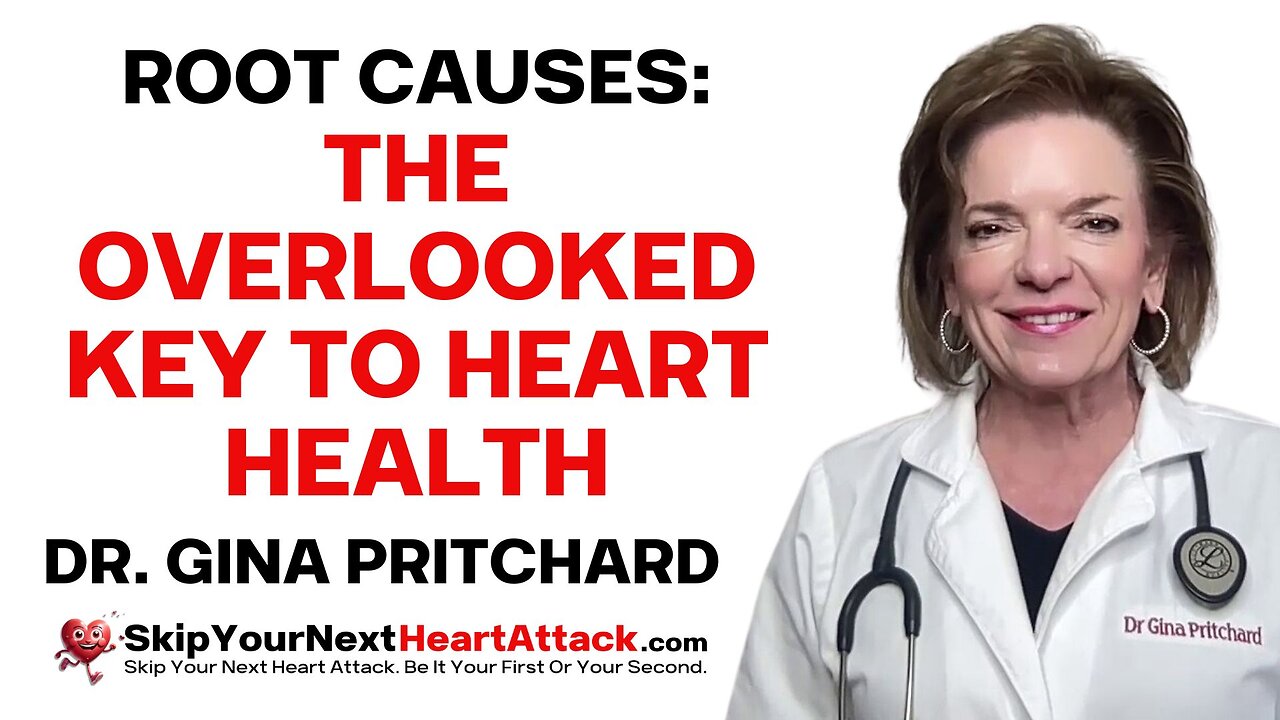Premium Only Content

Root Causes: The Overlooked Key to Heart Health | Dr. Gina Pritchard
Root Causes: The Overlooked Key to Heart Health | Dr. Gina Pritchard
For more information, visit https://skipyournextheartattack.com
I discovered after many years of this was that first of all, a typical patient that comes in with a heart attack and then goes to the cath lab, which is a picture of what we're seeing here, the cath lab team, heart catheterization team trying to open up a blocked blood vessel in the heart arteries.
That's the way we save lives and we have the best technology, the best health care teams in the United States. So if someone is having a heart attack, that's exactly what you need. But then what I discovered is I would be sending patients home, discharging them from the hospital and seeing them back in the clinic after a procedure like this, after saving their life from a heart attack, and tell them, "we took care of that blockage that was 99% or 100% or 85%. Don't worry. It's wide open now. You've got a stint in there. You're on maximal medical management or some people call it optimal medical management now. And so things are fine. We're going to work on your diet. You call me if you have chest pain."
So, the reason that patients keep coming back is because we leave all of this vascular disease untreated. We're led down this path of the lie that mild blockages or small amounts of vascular disease are not dangerous. We took care of the bad one. But now, you know, don't worry about the little ones. "You're on optimal medical management."
So have you ever felt like- this is what I began to feel like as I was rounding on people in the hospital, seeing them in the clinic, realizing this wasn't really the truth. If I reassured them things were fine because that blockage was open, knowing there was other areas of smaller amounts of plaque throughout their vascular system.
But we would just focus on the wrong thing: meds. "Are you having chest pain? How's your diet? Are you exercising?" In a very cursory way, not in depth at all. So after months of this and finding out that there are more powerful prevention techniques, which requires collaboration, like we're talking about today.
I felt like I was focusing on mowing the lawn, for example, while the house is on fire behind me. When patients would come to the office, I would feel like it's just a glorified medication check. "How are you doing on that medication? No side effects? Okay. Your blood pressure is pretty good. Your heart rate's pretty good. Yeah. Your lipids are pretty good. Call me if you have chest pain."
So, I discovered I was focusing on the wrong thing. It was inaccurate, what I was taught to focus on.
Here's some examples. If we stop mowing the lawn and focus on identifying and eradicating root causes, inspecting the coronary wall, the wall of the artery where plaque lives, looking at things like are there airway issues? Saliva testing? Is there bacterial pathogens lurking? Blood work? Where the fire is lurking, meaning that's how we can find out if inflammation and infection is actually happening, then cardiovascular disease would not be the top killer, periodontal disease would not be prevalent.
And we do now have better measures to understand these things. Everything we were taught is wrong. We need to use these new measures. We need to use collaboration to truly save lives. So we, rather than accepting this is how I would practice in the clinic, that a fasting blood sugar above 95 is okay, and a non-fasting above 200, okay. From now, in time to time, you're going to see that blood pressure of 140 or over 90 or even higher. I can't count the times I would say, "okay, keep track of it at home. We're going to check it again next time. And maybe we need to go up on your blood pressure medications."
Do you know there's many other things we can do to reduce blood pressure besides going up on the medications? And even if we have to go up on the medications for a little while, blood pressures at 140 over 90 or anything above 118 over 80 is causing damage to the brain, to the heart, to our organs every day.
So, we need to get away from focusing on these high-level metrics we have and look at the nuances. I'd look at cholesterol numbers and say, "that's pretty good."
We kept just putting in stints. "If you have another problem, if you have more chest pain, we'll just put in another stint and send you home on the same meds, more meds," and we would watch year after year, mild to moderate AHI scores. And we now know that's killing people, to just monitor a mild to moderate AHI and not really seek out the root cause. Can we do better?
-
 1:57:23
1:57:23
The Charlie Kirk Show
2 hours agoConfirmation Mania: Day 4 + AMA | Comer | 1.17.2025
115K25 -
 LIVE
LIVE
SIEFE
2 hours agoRED DEAD REDEMPTION 2 LIVE!
161 watching -
 2:08:26
2:08:26
Film Threat
15 hours agoWOLF MAN + PETER PAN'S NEVERLAND NIGHTMARE + MORE GORE! | Film Threat Livecast
19.9K -
 34:28
34:28
Tudor Dixon
5 hours agoHypocrisy and Accountability in Politics with Sen. Markwayne Mullin | The Tudor Dixon Podcast
32.5K3 -
 1:39:18
1:39:18
The Shannon Joy Show
5 hours ago🔥🔥Live EXCLUSIVE With Edward Dowd: Trump CANNOT Stop The Worldwide Economic Collapse🔥🔥
11.9K7 -
 1:03:32
1:03:32
The Dan Bongino Show
5 hours agoTrump Joins The Show To Drop Massive Truth Bombs (Ep. 2403) - 01/17/2025
743K1.67K -
 LIVE
LIVE
Right Side Broadcasting Network
4 days agoLIVE: RSBN Pre-Inauguration Coverage: Day Two Live from Washington D.C. - 1/17/25
2,867 watching -
 21:42
21:42
The Rubin Report
4 hours ago‘Piers Morgan’ Panelists' Jaws Drop as Liberal’s Entire Narrative Obliterated w/ One Question
68.9K34 -
 1:37:57
1:37:57
Steven Crowder
5 hours agoMAGA: T-Minus Three Days | Everything We Want President Trump to do on Day One
264K123 -
 1:14:04
1:14:04
Dave Portnoy
21 hours agoThe Unnamed Show With Dave Portnoy, Kirk Minihane, Ryan Whitney - Episode 42
60.3K5